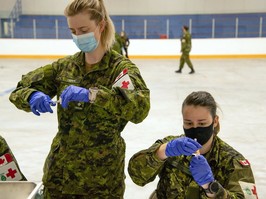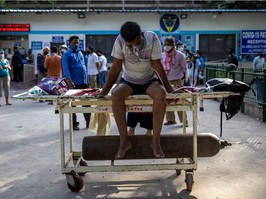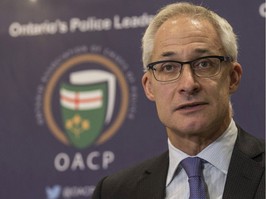ont. hospitals closing pediatric wards, forcing sick kids to travel to to
the children’s units have either re-deployed staff to other areas of over-burdened hospitals, or converted their beds to adult care
we apologize, but this video has failed to load.
try refreshing your browser, or
tap here to see other videos from our team.
tap here to see other videos from our team.
more than a hundred ontario children have travelled to downtown toronto in the last two weeks to be admitted to one of the country’s most advanced pediatric hospitals.they don’t actually need the highly specialized care offered by sickkids; their local, community hospital could have looked after them perfectly well.but across the greater toronto area — canada’s pandemic epicentre — the pediatric wards at more than a dozen hospitals have closed their doors to children, one of the most extraordinary moves yet to cope with a surge in coronavirus cases.the children’s units have either re-deployed staff to other areas of over-burdened hospitals, or converted their beds to adult care.those local facilities are still seeing kids in their emergency departments, but if they have to be admitted, most are sent to the hospital for sick children.by monday, two weeks into the project, 110 had made the trip to toronto from as far as 70 kilometres away in oshawa.“what we are now transferring is otherwise healthy children who would not normally have needed tertiary-level care,” said dr. julia orkin, a sickkids’ liaison to outlying hospitals. “i think pediatrics has felt somewhat protected in different ways. this is us stepping up to the community: ‘here we are, we’re helping.’”the shift comes amid a surprising, non-viral epidemic among young people: a spike in teenage eating-disorder cases. sickkids is now seeing more than three times the usual volume of such patients, a troubling side effect of the pandemic and lockdowns.on the other hand, pediatric medicine has been helped by an almost non-existent flu season and a lack of other infectious diseases among children who have lived largely in isolation the last year.“it’s challenging for families right now,” said dr. charmaine van schaik of southlake regional health centre in newmarket. “all our families have great faith in sickkids … but it’s still different having to have your child down there when they could have had care closer to home.”she said late last week her facility had already dispatched a half-dozen or so child patients to the toronto institution, 50 kilometres to the south, most by ambulance or air-ambulance, adding to the burden on the province’s patient-transfer system.but southlake’s situation underscores the challenges facing hospitals in the gta. the number of covid patients admitted in the last two weeks has soared 76 per cent, while admissions to the intensive care unit have spiked 230 per cent, said van schaik.across ontario, but mostly in toronto and neighbouring peel region, hospitals reported more than 2,200 admitted covid patients monday, almost 880 in the icu and over 600 on ventilators.the strain has forced the hardest-hit centres to transfer patients to less-busy hospitals, sometimes half-way across the province.closing pediatric wards to children is not affecting the quality of their care, but will give hot-spot hospitals more capacity to deal with the covid-19 third wave, orkin said.at william osler health centre, whose sites in northwest toronto and brampton are among the busiest covid hospitals in the country, the pediatric units have already been repurposed to treat adults as the facilities grapple with “exceptionally high volumes” of coronavirus sufferers, said spokeswoman emma murphy.thanks to the near-disappearance of seasonal flus and other viruses, at least the hospitals are seeing less of some pediatric patients, saiddr. dina kulik, a pediatric emergency physician and university of toronto professor.but another phenomenon has added to the burden. eating-disorder patients have exploded in number, with some still being stabilized at community hospitals, some treated at sickkids.at southlake, for instance, the usual two patients has jumped to a half-dozen, and more are expected. and with physical, social and psychological needs, they tend to stay in hospital for weeks or even months at a time, said van schaik.many of the recent influx of eating-disorder patients are actually high-achieving students and talented athletes, she noted.“when a lot of this was taken away from them, especially their extra-curricular involvement … they refocused their energy somewhere else, and the focus has come here,” said van schaik.“it’s really very curious,” she added. “i don’t think a lot of us would have anticipated this being a side effect of the pandemic.”all the hospitals stress that their emergency departments remain open to children. and as dramatic as closing the pediatric units might seem, the alternative for covid-strained hospitals was worse — “extreme” measures like putting patients in tents or using staff without the appropriate training, said orkin.“children are still getting exactly what they need,” said the sickkids physician. “our adults deserve the same. they don’t deserve lesser care or sub-standard care.”(april 27, 11:30 a.m., removed incorrect reference to 20 eating-disorder patients at sickkids.)
 3 minute read
3 minute read





